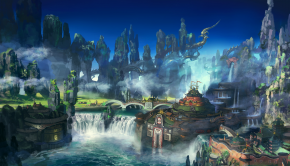Nobuko Toda Profile
 |
Also Known As: 戸田 信子 (とだ のぶこ) / Irone Toda |
| Date of Birth: November 18, 1972 (Tokyo) |
|
| Residence: Tokyo |
|
| Game Works: Metal Gear, Terror of the Stratus, Halo 4 |
|
| Official Site: – Japanese Site |
History
| Organisation | Type | Tenure | Role |
| Konami (Kojima Productions) | Game Developer | 2004 – 2010 | Sound Designer |
| HAL Tokyo Music Department | Academic Institution | 2010 – 2012 | Lecturer |
| Film Score LLC | Music Production | 1984 – 1995 | Founder, President, Composer, Arranger |
Biography
Nobuko Toda is a cinematic composer and orchestrator best known for her works on the Metal Gear franchise. Born on November 18, 1972 in Tokyo, Toda learned to play the piano and electric piano the age of four. Soon enough, she started to compose her own music, writing pieces to accompany picture books and stories she read during nursery. The connection between music and visuals continued to fascinate Toda into her adolescence and she particularly admired the film scores of John Williams. Video games proved less influential to her, given she only played on a few occasions as a child. Hoping to become a film composer, she enrolled at Boston’s Berklee College of Music at the age of 27. The artist only intended to enroll for a year or two, due to the expensive tuition fees and living costs, but ended up winning various awards and scholarships to study longer. Toda took majors in Film Scoring and Contemporary Writing / Production, both of which proved essential for her work in the music industry. While studying at Berklee, Toda wrote music for several television commercials and shorts such as ZERO. Though such experiences were positive, they were not enough for her to sustain a career and she started looking for an in-house position as a composer to start building a career.
While Toda didn’t initially consider composing for video games, she was intrigued to learn that Konami were looking to recruit a compose with experience in cinematic scoring. It was ultimately fellow Berklee alumnus Norihiko Hibino that heard her demos and recommended her for the job. Starting work at Kojima Productions in January 2004, Toda initially helped to score the cinematic scenes of Metal Gear Solid 3: Snake Eater, which spanned an overwhelming three hours in total. Benefiting from her previous experience and intensive study of the script, she was able to suitably reflect the atmosphere and development of such scenes. Under the guidance of sound director Hibino, she also developed a strong understanding of the Metal Gear sound. She simultaneously composed approximately half of the score for the PSP’s Metal Gear Acid, offering a mixture of background music and cinematic underscores. As a handheld score, her tracks tended to be shorter and thinner than those on Snake Eater, yet they still managed to preserve the distinctive mood of the series. Returning to the sequel, she focused on ambient underscoring once more, while ensuring her contributions were richer than before. Between such roles, she also squeezed in a contribution to Boktai 2: Solar Boy Django.
In the years thereafter, Toda emerged as a leading member of the Kojima Productions team. Taking a significant role on Metal Gear Solid: Portable Ops, she blurred the boundaries between music and sound design on several of the cinematic cues, between writing the haunting lyrics of the theme song “Calling to the Night” on behalf of Akihiro Honda. In smaller roles, she joined the ensemble sound team for Lunar Knights, wrote three tracks for Suikoden V’s arranged album, and penned two special theme songs for HIDECHAN! Radio. In her career breakthrough, she was promoted to music director and lead composer on Metal Gear Solid 4: Guns of the Patriots. During the game’s long development, she carefully coordinated responsibilities between internal and external composers, working side-by-side with Hollywood composer Harry Gregson-Williams among others. With the combined weight of the film-quality production values, unparalleled number of cinematic scenes, and the legacy of the esteemed franchise, the project proved incredibly demanding for her. Throughout the game’s epic cinematic tracks, she blended dynamic, lyrical orchestration with electronic approaches. Her other responsibilities included the “Love Theme”, a beautiful Hebrew lament sung by Jackie Presti and later arranged for Super Smash Bros. Brawl.
Following the release of her magnum opus, Nobuko Toda concluded her time at Konami by making guest contributions to a range of releases. The artist penned several mature tracks on Doctor Lautrec and the Forgotten Knights, brought rousing orchestral and choral anthems to Pro Evolution Soccer 2011, and even contributed some classically-oriented themes for the seventh and eighth Quiz Magic Academy titles. Back with the team of Kojima Productions, Nobuko Toda returned to compose a portion of Metal Gear Solid: Peace Walker; she expressed a gamut of moods in her compositions, while also scribing the lyrics for the iconic theme song “Heaven’s Divide”. While working at Konami, Nobuko Toda also worked on a number of television and film scores in her spare time under the pseudonym Irone Toda. She made her debut as a feature film composer with Shibuya Maruyama Story, an intimately-scored romance film, and also cultivated relationships with directors Koto Nagata and Hiroyuki Nakao on acclaimed shorts such as Time Medicine, The Secret Show, Trainsurfer, and Showa Dynamite. The artist further raised her profile by handling television scores for the Japanese arms of Cartoon Network (Highway 77) and Disney Channel (Hobby de Friends). Having gained experience and developed connections through her game and film work alike, she was in a good place to initiate a career as a freelancer. After wrapping up production on several projects, she left Konami in March 2010.
Following her departure, Nobuko Toda engaged on two new ventures. Having a long-standing interest in educating young people, she joined the music department of the special technology and design college HAL Tokyo in 2010. Over the subsequent two years, she taught students various aspects of game and film scoring alongside fellow industry veterans Kenichiro Fukui and Taihei Sato. She simultaneously established the music production company Film Score LLC; with bases in both Tokyo and Los Angeles, the company is dedicated to offering composition, orchestration, and sound design for a range of film, television, and game projects. In the company’s first years, Toda worked on the short films Heaven’s Island, Line, Escape, and Memories from Above on behalf of various directors. Also maintaining a strong relationship with Hiroyuki Nakao, she penned the theme song for the third, fourth, and fifth seasons of NHK’s Time Scoop Hunter, a show that illustrates the lives of ordinary people from the past. At request from fellow Konami veteran Akira Yamaoka, she offered the sombre string quartet opening to the charity album Play for Japan and arranged a theme song for the audio drama album Shitsuji Yuugi Tan.
Nevertheless, a large portion of Toda’s work since going freelance has been for video games. Still maintaining strong ties with her former employer, the artist wrote the majority of the music for Terror of the Stratus, an action RPG for the PSP. Throughout the soundtrack, she blended the production values of Hollywood with the unexpected hybrids, memorable melodies, and outward emotionality inspired by the creative tradition of Japan. The artist also explored lighter sounds while penning tracks for the Arcade card battler Oreca Battle and the 3DS adventure Magician’s Quest: Town of Magic, including a theme song for the latter. The artist also took a major role on the Metal Gear 25th Anniversary Music Collection, by revisiting the “Love Theme” and adapting the Guns of the Patriots and Peace Walker scores into orchestral medleys performance by the City of Prague Philharmonic. Also forming ties with other companies, she was responsible for classical adaptations featured in the Fantasia segment of Square Enix Kingdom Hearts 3D: Dream Drop Distance during 2012. Marking her first collaboration with a Western developer, Toda also orchestrated a significant portion of Halo 4’s score — composed by fellow Metal Gear veteran Kazuma Jinnouchi — for performance by the Hollywood Studio Symphony.
Having recently left her post at HAL Tokyo, Toda is currently developing Film Score LLC into a fully-fledged music production company and has already landed roles on major projects. In the realm of live-action, Toda was responsible for the soundtrack for the romantic comedy series Mischievious Kiss: Love in Tokyo and helped to bring Time Scoop Hunter to the big screen. She has recently wrapped up work on two feature films, the youkai title Bakaneko and the samurai epic Uzamasa Lastlight. In the realm of video games, the artist worked extensively as an orchestrator and arranger on 2013’s Final Fantasy XIV: A Realm Reborn, bringing a cinematic quality and great finesse to the greatly-revamped score. Through her connection with Akira Yamaoka, she has also forged a strong relationship with Grasshopper Manufacture; having written additional music on Lollipop Chainsaw, she was appointed co-music director on the eclectic ensemble score for Killer is Dead. Among her upcoming projects are Metal Gear Solid V: The Phantom Pain. As a score producer, an orchestrator, and writer of the theme songs “Sin of the Father” and “Silient”, Toda will no doubt bring much emotion to Big Boss’ next outing. With major successes in video games, television, and film, Toda is one of the most successful composers to recently enter the music-for-visuals industry.
References:
– Various Game & Album Credits
– VGMdb Discography
– Official Site (English)
– Official Resumé (English)
– Interview with Berklee (English, Japan 2011)
© Biography by Chris Greening (March 2013). Authorised by Nobuko Toda. Last updated on March 22, 2013. Do not republish without formal permission.
Posted on March 22, 2014 by Chris Greening. Last modified on April 7, 2014.














